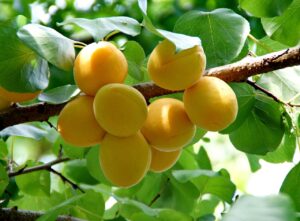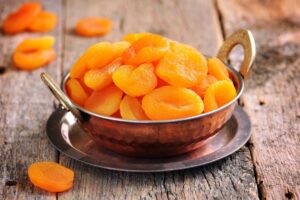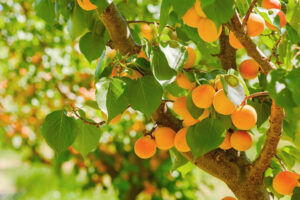Armenia, often called the land of apricots, is emerging as a strategic source of premium apricots for India’s agribusiness sector. The Armenia-India Business Council (AIBC) invites Indian importers and retailers to discover the unique advantages of sourcing Armenian apricots – from fresh, juicy fruits to organic sun-dried varieties. Armenia’s deep apricot heritage, robust production capacity, and growing export infrastructure make it an ideal partner for India’s rising demand in fresh and dried fruits.
Armenia’s Apricot Heritage & Quality

Armenia is world-renowned for its apricots – so much so that the fruit’s Latin name Prunus armeniaca means “Armenian plum,” reflecting its ancient roots in Armenian soil. Apricots are more than a crop in Armenia; they are a national symbol intertwined with culture and history. The orange color in Armenia’s flag is often referred to as “apricot,” and even the traditional woodwind instrument (duduk) is carved from apricot wood. Generations of cultivation in high-altitude orchards have yielded apricots with exceptional flavor: Armenian apricots are famously sweet, fragrant, and juicy, with locals proudly claiming they are the world’s best. Consumers immediately notice the plump, velvety texture and rich taste of Armenian apricots, often described as unmatched by any other origin.
Robust Production & Export Capacity
High-Yield Harvests: Despite its small size, Armenia ranks among the world’s top 10 apricot producers, harvesting about 113,500 tonnes in 2022. This thriving output is enabled by Armenia’s sunny climate and fertile volcanic soils, especially in the Ararat Valley which produces particularly sweet, high-sugar apricots. The country has a track record of sizable harvests and the ability to export surpluses in good years. (For example, Armenia’s apricot exports hit a record 23,240 tonnes in a bumper 2013 season, with ~20,000 tonnes shipped to Russia alone.)
Consistent Export Volumes: In recent years, Armenian growers have maintained a steady export supply of fresh apricots, primarily serving neighboring markets. Armenia exported about 5,300 tonnes of fresh apricots in 2023 (valued at $6.15 million), following 5,743 tonnes in 2022 (worth $8.8 million). This reliable volume underscores Armenia’s capacity to fulfill international orders even as new markets open up. While Russia currently accounts for the bulk of fresh apricot exports, there is ample room to direct high-quality Armenian fruit to India and other Asian markets.
Dried Apricots Availability: Alongside fresh fruit, Armenia produces excellent dried apricots, leveraging traditional sun-drying methods. Recent export figures show 100+ tonnes of dried apricots shipped annually (about 104 tonnes in 2023) to markets like Russia, the US, and Europe. Notably, Armenian dried apricots saw a competitive pricing trend last year – exports were valued around $5.3 per kg in 2023, down from ~$7.7 per kg in 2022. This price easing makes Armenian dried fruit even more attractive for importers seeking value. Fresh apricot export prices have likewise been favorable, averaging roughly $1.2 per kg in 2023. Indian buyers can thus secure premium-quality apricots at competitive wholesale rates, especially as Armenia’s export volumes grow.
Value-Added Processing & Niche Varieties
Beyond raw fruit exports, Armenia offers strong processing capabilities that add value to its apricot output. The country’s processors include modern packers, canneries, and drying facilities:
• Canneries and Puree Production: Armenian factories turn thousands of tons of apricots into purées, juices, jams, and concentrates each season. (In one year, 28 canneries absorbed 13,000+ tonnes of apricots for processing, highlighting the scale of Armenia’s fruit-processing industry.) These capabilities mean Indian companies can source apricot ingredients – e.g. aseptic purées or IQF (frozen) apricot dices – for use in beverages, dairy, or confectionery.
• Dried Fruit Expertise: Sun-drying is a time-honored method in Armenia. Organic unsulfured dried apricots are a specialty: unlike the bright orange sulfur-treated dried apricots common elsewhere, Armenia’s natural dried apricots have a deep amber-brown color and rich, caramel-like sweetness (no additives). This organic approach caters to health-conscious consumers – offering preservative-free dried fruit with full flavor and nutrients intact. In fact, Armenian organic apricots are praised for having an intense flavor and even a bright orange hue naturally – a rarity among unsulfured dried fruits. Such quality differentiation can give Indian importers a niche edge in the market.
• Premium Varieties: Armenia’s apricot varietals, such as the famous “Shalakh” (Yerevan apricot), are known for their large size, tender texture, and sweet taste with a hint of tang. These heirloom varieties command premium prices and could be introduced to discerning Indian consumers as a luxury fruit. There is also potential in apricot kernels and oils (used in confectionery and cosmetics), which Armenian producers can supply as by-products of fruit processing.
Opportunities for Indian Importers

For India’s fresh fruit importers, dried fruit dealers, and retailers, partnering with Armenia unlocks several compelling benefits:
• Premium Quality & Story: “There is not an apricot in the world that tastes like the ones found in Armenia,” as locals proudly attest. Indian retailers can market Armenian apricots as a premium category – backed by a rich story of heritage (the fruit that Alexander the Great allegedly brought from Armenia to the West) and cultural significance. This storytelling adds value and consumer interest, whether for fresh apricots in gourmet grocery aisles or branded Armenian dried apricots in the health snacks section.
• Reliable Supply & Scale: With over 100,000 tonnes of annual production in a good year, Armenia can reliably fulfill sizable orders. The export infrastructure is already in place (demonstrated by consistent shipments of thousands of tons of fresh apricots each year) and can be scaled further. Indian importers looking to diversify sources will find in Armenia a stable, grower-direct supply of high-quality fruit. Moreover, Armenia’s membership in the Russia-led Eurasian Economic Union (EAEU) means harmonized standards and practices that have prepared its produce sector for international trade.
• Diverse Product Range: Indian buyers can source both fresh and processed apricot products from Armenia through one channel. This opens opportunities to bundle offerings – for example, importing fresh apricots during the summer harvest (to offer Indian consumers a taste of “Armenia’s golden apricots”) and dried apricots or apricot jam year-round. Armenia’s organic and unsulfured dried apricots, in particular, could fill a growing niche in India for natural and organic dry fruits. The country’s processors also produce apricot juice concentrates and purees, which Indian beverage or bakery companies can utilize for product innovation.
• Trade Support & Collaboration: The Armenia-India Business Council (AIBC) is actively fostering agribusiness ties. Indian importers tapping into the Armenian apricot market won’t be going it alone – AIBC and Armenian exporters are keen to collaborate, offering support in navigating quality standards, export documentation, and matchmaking with reliable Armenian suppliers. This collaborative approach can shorten learning curves and build trust in the supply chain.
Logistics & Market Access
Despite the geographic distance, connecting Armenia’s apricots to India is increasingly feasible and cost-effective:
• Efficient Supply Routes: Armenia’s location in the Caucasus offers multiple logistics options for reaching India. One viable route is overland through Iran – Armenian apricots can be trucked south to Iranian ports (such as Bandar Abbas on the Persian Gulf) and then shipped by sea to Indian ports like Mumbai or Mundra. This North-South corridor via Iran provides a relatively short transit, leveraging established transport links between Iran and India. Alternatively, shipments can go via the Black Sea (through Georgian ports) onward through the Suez to India. Air freight is also an option for high-value or time-sensitive fresh fruit shipments, given Armenia’s modern air cargo facilities.
• Streamlined Trade Processes: Both Armenia and India are improving trade facilitation. Armenia has phytosanitary standards aligned with international norms (thanks to its export experience to stringent markets like the EU), ensuring that Indian import requirements for fruits are met. With the help of AIBC, importers can efficiently handle any documentation and regulatory checks. As India explores stronger ties with Eurasian countries, early movers in importing from Armenia could benefit from emerging preferential arrangements or reduced tariffs in the future.

Partner with Armenia for Your Apricot Needs
Indian agribusiness leaders, importers, and retail buyers – now is the time to explore Armenia as your next sourcing destination for apricots. By bringing Armenia’s “golden” apricots to your supply chain, you can offer customers a superior product with a unique story, diversify your supplier base, and potentially enjoy healthy margins thanks to competitive pricing. The Armenia-India Business Council is here to facilitate connections and provide insights to get you started.
Connect with AIBC to kickstart a fruitful partnership. Let’s transform Armenia’s legendary tsiran (apricot) into a new success story in India’s markets. Together, we can deliver the best of Armenia’s orchards to Indian consumers – a sweet opportunity that benefits all.
Ready to explore Armenian apricot imports? Contact us at AIBC to learn more about suppliers, logistics, and opportunities to collaborate. Armenia’s finest apricots await your discovery – don’t miss out on this fresh and dried fruit opportunity!
